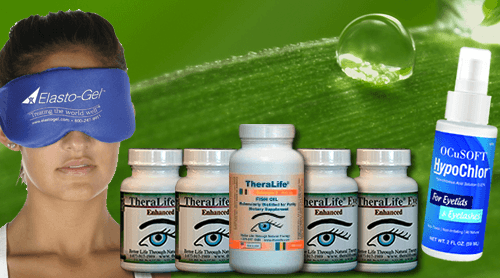To enhance the management of Sjogren’s symptoms, TheraLife’s products provide comprehensive support through their anti-inflammatory, hydrating, and nutrient-rich formulations. These products are designed to complement a diet rich in omega-3s and vitamin C, known for reducing inflammation and boosting the immune system, respectively. By incorporating ingredients that promote hydration and antioxidant protection, similar to those found in cucumbers, watermelon, and berries, TheraLife aids in maintaining moisture balance and combating oxidative stress.
Furthermore, TheraLife emphasizes the importance of gut health, crucial for those with autoimmune conditions like Sjogren’s. Their offerings include probiotics and high-fiber components, akin to the benefits found in berries, to support digestive wellness. The easy-to-digest nature of their products ensures gentle nutrient absorption, making them ideal for those with sensitive systems.
By integrating TheraLife’s products into your daily routine, you can naturally support and optimize your diet for Sjogren’s, improving your overall health and well-being. Discover how TheraLife can be a valuable addition to your health regimen by visiting their website for more insights and product details.
Powerful Dry Eye Relief For Sjogren’s- All Natural
Add To CartKey Takeaways
- Anti-inflammatory foods like turmeric and omega-3s reduce inflammation and alleviate Sjogren’s symptoms.
- Hydrating foods such as watermelon and cucumbers enhance moisture retention and stimulate saliva production.
- Antioxidant-rich options like berries combat oxidative stress and protect against cellular damage in Sjogren’s.
- Easy-to-digest foods like broth-based soups ensure nutrient absorption without causing discomfort.
- Vitamin-packed selections, including leafy greens and citrus fruits, support immune health and overall wellness.
Anti-Inflammatory Foods
When managing Sjogren’s symptoms, incorporating anti-inflammatory foods into your diet can be a beneficial strategy.
Start with anti-inflammatory spices like turmeric, rich in curcumin, known for its ability to reduce inflammation. Pair this with whole grain options such as oats and quinoa.
These grains aren’t only high in fiber, which helps alleviate inflammation, but they also provide essential nutrients. You can enhance your meals with omega-3 rich foods like flaxseeds and chia seeds, which support overall health by reducing inflammation.
Don’t forget antioxidant-rich foods like berries and leafy greens; they’re packed with nutrients that protect your cells.
For patients with Sjögren’s syndrome, maintaining a comprehensive evaluation is crucial to differentiate symptoms from other conditions, ensuring the right dietary and treatment strategies are employed.
Moisture-Rich Choices
Although managing Sjogren’s symptoms can be challenging, incorporating moisture-rich foods into your diet is a practical approach to alleviate discomfort.
Foods high in water content, like watermelon, cucumbers, and celery, offer significant hydration benefits, playing an essential role in moisture retention. It’s important to regularly drink water throughout the day to further support these benefits. For individuals with Sjogren’s, combining dietary changes with autoimmune treatments can lead to better management of symptoms.
Soups, especially broth-based ones, not only enhance hydration but are also easy to swallow, making them ideal choices.
Leafy greens such as lettuce and spinach are both hydrating and packed with nutrients.
Enjoy fruits like cantaloupe and oranges, which are rich in water content, to further support hydration.
Additionally, opting for yogurt or kefir can soothe the mouth while providing essential nutrients.
Antioxidant Benefits
Incorporating antioxidant-rich foods into your diet can play an important role in managing Sjogren’s Syndrome by reducing oxidative stress and enhancing immune function. Nutrient-dense options like fruits, vegetables, and omega-3 fatty acids help combat inflammation and may improve symptoms such as dryness. Including vitamin D from eggs and fortified products can further support immune health and aid in symptom relief. The gut microbiome significantly influences immune responses and overall health, and dysbiosis has been linked to Sjogren’s development and symptom exacerbation.
Reducing Oxidative Stress
To effectively reduce oxidative stress in Sjögren’s syndrome, focus on incorporating antioxidant-rich foods into your diet. You can counter oxidative damage by achieving dietary balance with nutrient-dense options. Start with antioxidant-packed fruits like blueberries and raspberries, which protect cellular health. Include leafy greens like spinach and kale, rich in vitamins and minerals that not only reduce inflammation but also support immune health. Nuts and seeds such as almonds and walnuts offer healthy fats and antioxidants, essential for reducing oxidative stress. Omega-3 fatty acids from fatty fish and flaxseeds provide anti-inflammatory benefits. Adding fermented foods like kombucha and bone broth may further aid in managing inflammation and supporting gut health, which is crucial for those with autoimmune conditions. JAK inhibitors, which influence pathways involved in Sjögren’s syndrome, may also have a role in modulating oxidative stress by affecting ICAM-1 and PD-L1 expression. Whole grains like oats and quinoa offer antioxidants like manganese. Hydrating foods, like watermelon, and tea rich in antioxidants, further help manage oxidative stress.
Enhancing Immune Function
A robust immune system is essential in managing Sjögren’s syndrome, and diet plays a pivotal role in enhancing immune function. To bolster your immune system, focus on dietary sources rich in omega-3 fatty acids, vitamin C, and vitamin D. Fatty fish like salmon and mackerel provide omega-3s, supporting cellular membranes and reducing inflammation. Citrus fruits and leafy greens offer vitamin C, a powerful antioxidant that boosts your immune system and alleviates inflammation. Sunlight and fortified dairy products supply vitamin D, vital for immune regulation. Additionally, incorporate high-fiber foods such as berries and cruciferous vegetables to ease inflammation and support gastrointestinal health. Sjögren’s syndrome is a chronic autoimmune disorder that affects moisture-producing glands, making anti-inflammatory dietary choices crucial for symptom management. Opting for a diet rich in these nutrients can help reduce flare-ups and improve overall well-being, similar to how TheraLife therapy aims to improve quality of life for those with Sjögren’s syndrome.
Easy-to-Digest Options
When managing Sjogren’s, choosing easy-to-digest foods can be gentle on your stomach and improve nutrient absorption. Opt for high-water content fruits like watermelon and cucumbers, which provide hydration and ease digestion. Incorporating moist foods such as broth-based soups and smoothies guarantees you receive essential nutrients without straining your digestive system. It’s crucial to be mindful of symptoms that wax and wane, as they can affect dietary needs and nutrient absorption. Including whole, unprocessed foods in your diet can help reduce inflammation and support overall health.
Gentle on the Stomach
Managing Sjogren’s symptoms effectively involves focusing on foods that are gentle on the stomach to minimize irritation and discomfort. Choosing foods with gentle flavors and soothing textures can help. Soft fruits like watermelon and cantaloupe are easy to digest and hydrate your body. Leafy greens, due to their high water content, offer similar benefits without overwhelming your digestive system. It’s important to avoid foods that are salty, sour, spicy, and carbonated to reduce pain and discomfort. Incorporating broth-based soups provides both hydration and ease of swallowing. Creamy, fermented options like yogurt and kefir not only support gut health but are also gentle on the stomach. When preparing meals, opt for room-temperature dishes and moisten foods with low-calorie dressings. Drinking while eating can further ease the swallowing process, making meals more comfortable and enjoyable. Sjögren’s syndrome often coexists with other autoimmune diseases, such as lupus and rheumatoid arthritis, which can influence dietary needs and considerations.
Nutrient Absorption Benefits
Understanding how diet affects Sjogren’s symptoms involves focusing on foods that aren’t only gentle on the stomach but also enhance nutrient absorption.
High fiber sources like raspberries and blackberries regulate digestion, promoting nutrient synergy. Whole grains, such as oatmeal and brown rice, are excellent for digestive health, guaranteeing your body absorbs essential nutrients efficiently. Given that 90% of individuals with primary Sjögrens report GI complaints, incorporating digestive-friendly foods is essential to manage symptoms effectively. Including Omega-3 Fish Oil in your diet can also support eye health and provide anti-inflammatory benefits, which is particularly beneficial for those managing autoimmune conditions.
Vegetables like squash and sweet potatoes are rich in fiber and improve nutrient uptake.
Incorporating these foods into your diet can yield significant benefits:
- Fiber-Rich Fruits: Raspberries and blackberries aid digestion and improve nutrient absorption.
- Whole Grains: Oatmeal and brown rice support gut health.
- Vegetable Options: Squash and sweet potatoes enhance nutrient synergy.
These choices guarantee that your body maximizes nutrient absorption while being gentle on your digestive system.
Vitamin-Packed Selections
While living with Sjogren’s syndrome, it’s important to focus on vitamin-packed foods that support overall health and immune function. Incorporating a variety of vitamin sources guarantees nutrient diversity, which is significant for maintaining health. Carrots, green beans, sweet potatoes, and winter squash are excellent sources of vitamins A and C, known for their protective benefits. Leafy greens like spinach and kale offer a rich supply of vitamins and minerals. Citrus fruits such as oranges and lemons provide a significant boost of vitamin C, fundamental for immune health. Don’t forget avocados, which are packed with vitamin E and healthy fats, promoting overall wellness. Additionally, nuts and seeds like almonds and sunflower seeds offer an abundance of important vitamins and healthy fats. Including foods with anti-inflammatory properties, such as berries and cruciferous vegetables, can further help in managing symptoms by reducing inflammation. For those dealing with dry eyes as a symptom, products like TheraLife Eye can be an effective part of managing tear production and overall eye health.
Probiotic Advantages
Exploring the advantages of probiotics reveals potential benefits for those with Sjögren’s syndrome, particularly concerning dry eye symptoms. A specific probiotic strain, *Limosilactobacillus reuteri* DSM17938, has shown promise in improving these symptoms by supporting eye health.
Probiotics enhance gut health, which can extend anti-inflammatory benefits to the eyes. They work by increasing goblet cells that produce mucin, a critical component of tears. Research indicates a link between gut bacteria and dry eye symptoms, suggesting that dietary changes may alleviate symptoms. Including Omega-3 fatty acids in your diet can further support eye health by reducing oxidation and maintaining freshness.
- Probiotics can strengthen immune function and improve intestinal barrier integrity.
- They inhibit pathogenic bacteria and support gut-distant mucosal health.
- Dysbiosis in the microbiome might contribute to Sjögren’s symptoms, making probiotics a valuable consideration.
Always consult your healthcare provider when incorporating probiotics, especially if you have immune concerns.
Omega-3 Sources
Building on the benefits that probiotics offer for managing Sjögren’s syndrome, omega-3 fatty acids also play a significant role in alleviating symptoms.
You can find these essential nutrients in dietary sources like salmon, mackerel, and sardines, which are rich in EPA and DHA. Plant-based options include flaxseed oil, chia seeds, and walnuts, which provide ALA, a precursor to EPA and DHA in the body. Omega-3 fatty acids have anti-inflammatory properties beneficial for joint pain, which is a common symptom of Sjogren’s syndrome.
For a more controlled intake, consider omega 3 supplementation through fish oil or vegetarian algal oil, which are processed to remove contaminants. Aim for 1,000-2,000 mg daily to help improve dry mouth and eye symptoms thanks to their anti-inflammatory properties.
Monitoring your omega-3 status can further optimize your therapeutic strategy.
Hydrating Ingredients
When managing Sjögren’s syndrome, incorporating hydrating ingredients into your diet can greatly alleviate dry mouth and eye symptoms.
Opt for fruits like watermelon and cantaloupe, as they boast high water content and essential vitamins. Invigorating snacks such as cucumbers and celery not only hydrate but also stimulate saliva production, enhancing oral comfort.
Hydrating smoothies can be made with leafy greens like spinach, rich in vitamin A, which supports healthy mucous membranes.
- Hydrating Fruits: Watermelon, cantaloupe, and grapes.
- Hydrating Vegetables: Cucumbers, celery, and leafy greens.
- Additional Ingredients: Yogurt, herbal teas, and unsalted nuts.
To maximize hydration, consider broth-based soups, which are nourishing and easy to consume, especially if you struggle with swallowing or chewing.
Frequently Asked Questions
How Does Sjogren’s Affect Daily Life?
Sjögren’s affects your daily life by causing fatigue and dry mouth, impacting your energy and comfort.
Managing these symptoms requires strategic lifestyle changes. Prioritizing nutrient-dense foods helps support fatigue management and maintain moisture levels in your body.
Staying hydrated and using sugar-free gum can alleviate dry mouth.
Emphasizing omega-3 fatty acids and antioxidants in your diet can reduce inflammation, enhancing overall well-being and helping you navigate the challenges of Sjögren’s.
Are There Specific Foods to Avoid With Sjogren’s?
You should avoid certain foods if you’ve got Sjogren’s. Reducing sugar intake can help manage inflammation, so skip those high-glycemic sweets.
Consider gluten sensitivity, as gluten may exacerbate symptoms. Also, steer clear of trans fats and red meat, which might increase inflammation.
Limiting dairy could prevent histamine release, worsening inflammation.
Focus on nutrient-rich options like fruits, vegetables, and omega-3 sources to support your health.
How Can Diet Complement Other Sjogren’s Treatments?
Imagine vibrant fruits and leafy greens dancing on your plate, providing essential nutrients and easing inflammation.
By making smart dietary adjustments, like incorporating omega-3-rich fish or antioxidant-packed berries, you can complement other Sjogren’s treatments effectively.
Nutritional supplements, such as probiotics, support gut health, while hydrating foods like cucumbers and watermelon maintain moisture.
Consulting healthcare professionals guarantees your diet is tailored, promoting ideal health while managing symptoms with balanced, nutrient-rich choices.
Can Exercise Help Manage Sjogren’s Symptoms?
Exercise can greatly aid in managing Sjogren’s symptoms.
You’ll experience reduced fatigue and improved mental clarity with regular aerobic activities. Cardiovascular exercises enhance your aerobic capacity and stabilize disease activity, leading to better overall health.
These exercise benefits are well-documented, showing improvements in physical fitness and quality of life.
Always consult your clinician to tailor a safe exercise program, ensuring it’s suited to your individual needs and promotes consistent symptom management.
What Are Common Symptoms of Sjogren’s Syndrome?
You’re likely to experience symptoms like dry mouth and joint pain if you have Sjogren’s syndrome.
Dry mouth happens because your body produces less saliva, which can lead to difficulty swallowing and an increased risk of oral infections.
Joint pain is common and often accompanies swelling or stiffness.
These symptoms highlight the need for a nutrient-rich diet to help manage discomfort and support overall health, especially focusing on hydration and anti-inflammatory foods.
Conclusion
In the vibrant garden of health, TheraLife’s products emerge as your trusted allies against Sjogren’s Syndrome. These products are designed to soothe and rejuvenate, offering your body a revitalizing experience akin to a refreshing rain. By incorporating essential vitamins and antioxidants, TheraLife’s offerings protect you from cellular damage, much like a shield. Their easy-to-digest and probiotic-rich formulations nurture your gut health, creating a foundation as fertile as rich soil.
TheraLife enhances well-being through Omega-3 sources and hydrating ingredients, orchestrating a harmonious symphony of health that resonates throughout your body. With a focus on anti-inflammatory and moisture-rich options, TheraLife ensures that your body feels nurtured and balanced, supporting a path towards holistic wellness.





